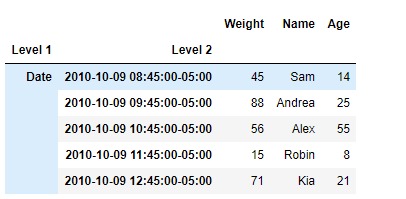Pandas DataFrame是帶有標簽軸(行和列)的二維大小可變的,可能是異構的表格數據結構。算術運算在行和列標簽上對齊。可以將其視為Series對象的dict-like容器。這是 Pandas 的主要數據結構。
Pandas DataFrame.tz_localize()函數將Series或DataFrame的tz-naive索引本地化為目標時區。此操作將索引本地化。
用法: DataFrame.tz_localize(tz, axis=0, level=None, copy=True, ambiguous=’raise’, nonexistent=’raise’)
參數:
tz:字符串或pytz.timezone對象
axis:定位軸
level:如果軸為MultiIndex,則定位特定級別。否則必須為None
copy:同時複製基礎數據
ambiguous:當時鍾由於DST而向後移動時,可能會產生不明確的時間
nonexistent:在特定時區中不存在不存在的時間,在該特定時區中由於DST而使時鍾向前移動
返回:與輸入相同的類型。
範例1:采用DataFrame.tz_localize()函數將數據幀的給定tz-naive索引本地化到目標時區。
# importing pandas as pd
import pandas as pd
# Creating the DataFrame
df = pd.DataFrame({'Weight':[45, 88, 56, 15, 71],
'Name':['Sam', 'Andrea', 'Alex', 'Robin', 'Kia'],
'Age':[14, 25, 55, 8, 21]})
# Create the index
index_ = pd.date_range('2010-10-09 08:45', periods = 5, freq ='H', tz = 'US / Central')
# Set the index
df.index = index_
# Print the DataFrame
print(df)輸出:

現在我們將使用DataFrame.tz_localize()函數將 DataFrame 的給定tz-naive索引本地化為“歐洲/柏林”時區。
# Let's find out the current timezone
# of the given dataframe
print(df.index)
# Let's localize the timezone of the
# dataframe index to 'Europe / Berlin'
df = df = df.tz_localize(tz = 'Europe / Berlin')
# Let's find out the current timezone
# of the given dataframe
print(df.index) 輸出:


正如我們在輸出中看到的,DataFrame.tz_localize()函數已成功將給定數據幀的tz-naive索引本地化為目標時區。
範例2:采用DataFrame.tz_localize()函數定位給定數據幀的tz-naive索引。給定數據幀的索引是一個MultiIndex。
# importing pandas as pd
import pandas as pd
# Creating the DataFrame
df = pd.DataFrame({'Weight':[45, 88, 56, 15, 71],
'Name':['Sam', 'Andrea', 'Alex', 'Robin', 'Kia'],
'Age':[14, 25, 55, 8, 21]})
# Create the MultiIndex
index_ = pd.MultiIndex.from_product([['Date'], pd.date_range('2010-10-09 08:45', periods = 5, freq ='H')],
names =['Level 1', 'Level 2'])
# Set the index
df.index = index_
# Print the DataFrame
print(df)輸出:

現在我們將使用DataFrame.tz_localize()函數將給定 DataFrame 的tz-naive索引本地化為“美國/中央”。
# Let's find out the current timezone
# of the Level 1 of the given dataframe
print(df.index[1])
# Let's localize the timezone of the
# level 1 of the dataframe to 'US / Central'
df = df.tz_localize(tz = 'US / Central', level = 1)
# Let's find out the current timezone
# of the level 1 of the given dataframe
print(df.index[1]) 輸出:


正如我們在輸出中看到的,DataFrame.tz_localize()函數已成功將給定 DataFrame 的tz-naive索引本地化為“美國/中央”。
相關用法
- Python pandas.map()用法及代碼示例
- Python Pandas Series.str.len()用法及代碼示例
- Python Pandas.factorize()用法及代碼示例
- Python Pandas TimedeltaIndex.name用法及代碼示例
- Python Pandas dataframe.ne()用法及代碼示例
- Python Pandas Series.between()用法及代碼示例
- Python Pandas DataFrame.where()用法及代碼示例
- Python Pandas Series.add()用法及代碼示例
- Python Pandas.pivot_table()用法及代碼示例
- Python Pandas Series.mod()用法及代碼示例
- Python Pandas Dataframe.at[ ]用法及代碼示例
- Python Pandas Dataframe.iat[ ]用法及代碼示例
- Python Pandas.pivot()用法及代碼示例
- Python Pandas dataframe.mul()用法及代碼示例
- Python Pandas.melt()用法及代碼示例
注:本文由純淨天空篩選整理自Shubham__Ranjan大神的英文原創作品 Python | Pandas DataFrame.tz_localize。非經特殊聲明,原始代碼版權歸原作者所有,本譯文未經允許或授權,請勿轉載或複製。
